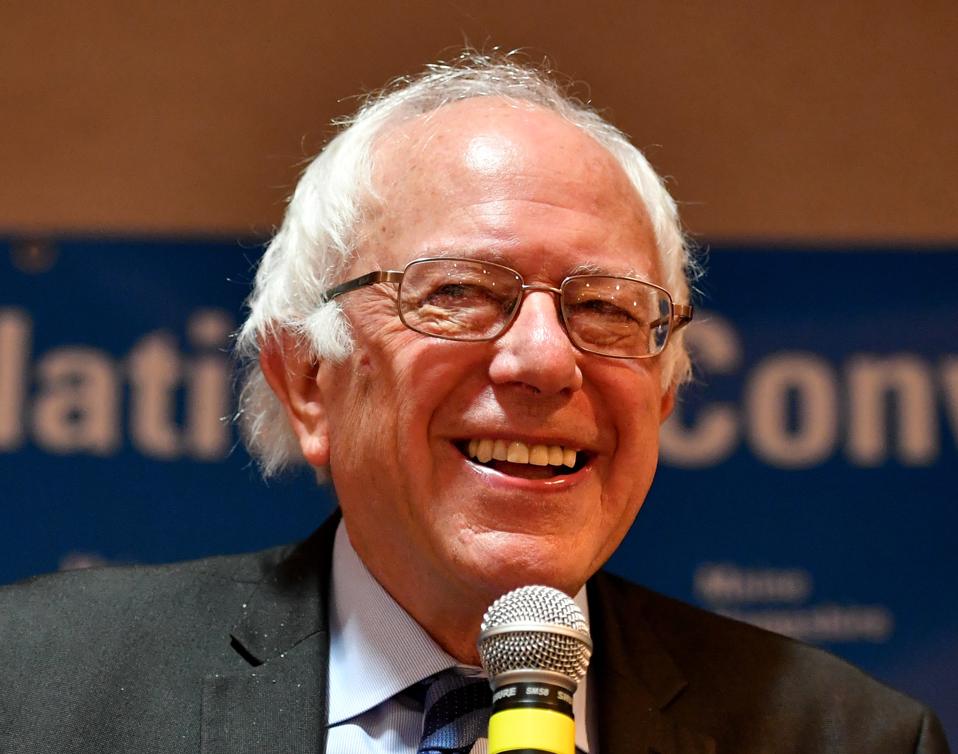
Sen. Bernie Sanders (Photo by Jeff J Mitchell/Getty Images)
GETTY IMAGES
Student loan forgiveness is a hot topic on both sides of the political aisle.
These five important questions are on the minds of many. Here’s what you need to know.
Student Loan Forgiveness: Sanders and Warren
As the race for president heats up, Sen. Bernie Sanders (I-VT) and Sen. Elizabeth Warren (D-MA), who are both 2020 presidential candidates, have shared competing visions for student loan debt forgiveness. The latest student loan debt statistics show that more than 44 million borrowers collectively owe about $1.6 trillion in student loan debt.
Both Sanders and Warren believe that wide-scale student loan forgiveness would, among multiple other benefits, free millions of Americans from debt so they can buy a home, save for retirement, launch a new business, and start a family. Some critics believe that, among other observations, these are wealth redistribution plans and are unfair to federal taxpayers and former borrowers who already paid off their student loans.
The Sanders plan is simple and straightforward: everyone gets student loan forgiveness. If you earn $10,000 or $10 million a year, you would receive student loan forgiveness for your federal and private student loans. The Warren plan would cancel student loan debt for more than 95% of borrowers, and would entirely cancel student loan debt for more than 75% of borrowers. Unlike the Sanders plan, if a borrower earns more than $250,000 a year, that borrower would not be eligible to receive student loan forgiveness.
Given this, here are five questions for both senators.
Cancel Student Loans: 5 Questions
1. Will people who already paid off their student loans be reimbursed?
If either plan is enacted, it’s clear that borrowers who have student loans at that time would receive student loan forgiveness. What about the borrower who worked three jobs to pay off her student loans diligently? Or the borrower who didn’t save as much for retirement so he could pay off his student loans? Or the borrower who paid off all her student loans yesterday? Are they all out of luck, or will they be reimbursed for their student loans either in cash or through an equivalent tax credit?
2. Will future borrowers receive any student loan forgiveness?
It’s clear that these plans would forgive student loans for existing borrowers. However, student loan borrowing will not stop. Students will still need student loans to fund their education. Yes, both candidates have called for tuition-free public colleges. Even if that becomes reality, students at private colleges and universities may still need loans. Also, students at public colleges may need student loans to cover non-tuition expenses such as room and board. Therefore, is this student loan forgiveness a one-time shot, or will these future borrowers receive any financial relief?
3. What if Congress doesn’t agree to raise taxes?
Both Sanders and Warren plan to pay for their respective student loan forgiveness proposals through new taxes. Sanders has proposed a new tax on financial transactions and Warren has proposed an Ultra-Millionaire Tax. Both Sanders and Warren have indicated they may not need Congress to forgive student loans, and therefore can execute student loan forgiveness without legislation. While some believe that only Congress (and not the president acting unilaterally) has the power to cancel student loan debt, either candidate, if elected, would need Congress to raise taxes to fund their respective plans. Unless the current power balance changes in the Senate, both tax proposals likely would face an uphill battle. If this is the case, what are the alternative strategies to fund their student loan forgiveness proposals?
4. Will all student loan forgiveness be tax free?
Both Sanders and Warren have said that their respective student loan forgiveness plans are tax-free to individual borrowers. The same holds true for Public Service Loan Forgiveness, a federal program that forgives federal student loans for borrowers who work for a qualified public service or non-profit employer. However, for income-driven repayment plans like Revised Pay As You Earn (REPAYE), you may owe income tax on the amount of federal student loans forgiven. Will the amount of student loan forgiveness under income-driven repayment plans remain taxable or also become tax-free?
5. Will colleges and universities lower tuition?
While both Sanders and Warren have advocated for tuition-free public college, will colleges and universities lower tuition? Borrowers borrow student loans based on the cost of college and graduate school. Lower tuition can reduce the amount of student loans that borrowers require to pay for school. On a related topic, some have suggested that colleges and universities should share in financial responsibility when a borrower defaults on a federal student loan. Currently, when a borrower defaults on a federal student loan, federal taxpayers may bear the cost. Would either candidate support this position to save taxpayers money and save borrowers money on their student loans?
[“source=forbes”]
